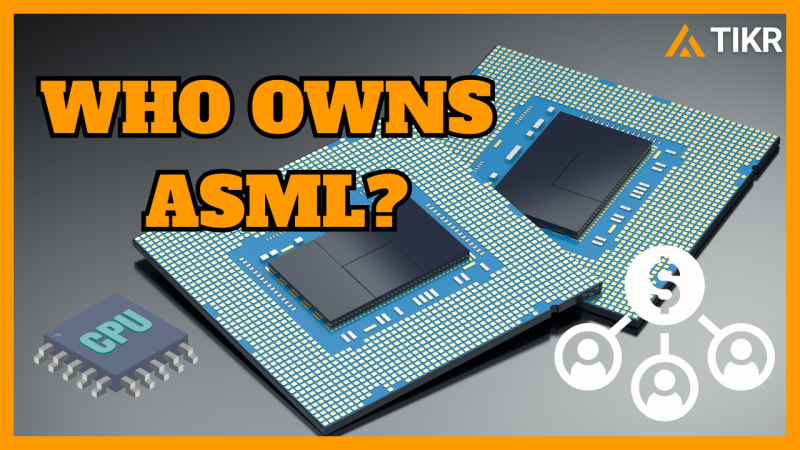ASML Holding N.V. (NASDAQ: ASML) builds the world’s most advanced lithography machines, including extreme ultraviolet (EUV) systems used to produce cutting-edge semiconductors for AI, smartphones, and data centers. Shares trade near $736 per share with a market cap of about $285 billion.
Its near-monopoly status, combined with industry-leading profitability (52.5% gross margins, 34.8% EBIT margins), makes ASML one of the most important companies in global technology. Still, the stock has fallen about 21% over the past year as weaker chip demand and export restrictions weighed on growth.
For institutions, ASML is both a high-quality compounder and a geopolitical balancing act. Its machines are central to the global chip race, giving it pricing power and long-term growth potential, but also exposure to political pressure and semiconductor cycles. Once concentrated among European investors, ASML is now widely held by global asset managers, sovereign funds, and pension systems, reflecting its rise from a niche supplier to a critical gatekeeper of the digital economy.
Looking at ownership shifts and insider trades helps reveal how major investors are positioning around ASML today.
The Big Money Behind ASML’s Stock

Track the top shareholders of over 50,000 global stocks (It’s free) >>>
ASML designs and manufactures advanced lithography machines that are essential for producing the world’s most sophisticated semiconductors. Its shareholder base is led by the largest global asset managers, alongside active institutions and sovereign wealth funds.
- BlackRock Institutional Trust: 31.3M shares (7.9%), ~$23.0B. Flat.
- Vanguard Group: 12.7M shares (3.2%), ~$9.4B. Small increase (+0.1%).
- Capital Research Global Investors: 11.9M shares (3.0%), ~$8.7B. Reduced by 28.8M shares (-70.8%).
- Norges Bank: 9.9M shares (2.5%), ~$7.3B. Trimmed 222K (-2.2%).
- BlackRock Advisors UK: 5.7M shares (1.4%), ~$4.2B. Added 45K (+0.8%).
- Amundi Asset Management: 5.2M shares (1.3%), ~$3.8B. Boosted 702K (+15.7%).
- Fidelity Management: 2.6M shares (0.7%), ~$1.9B. Small increase (+0.3%).
One highlight from last quarter is Schonfeld Strategic Advisors’ massive increase, boosting its ASML position by 1,438%. The fund now holds about 72,000 shares worth $58 million, a clear sign of growing conviction in the chipmaking leader.
Another notable move came from Adage Capital Partners, which raised its stake by 150% to 50,000 shares valued at $40 million. This jump suggests the fund sees opportunity in ASML after its recent pullback.
Amundi’s sharp increase suggests some institutions are taking advantage of the pullback, while Capital Research’s large reduction shows others are scaling back. The mixed positioning highlights uncertainty tied to chip demand and global trade risks.
See whether ASML’s top shareholders are buying or selling today >>>
What ASML’s Insiders Are Doing With Their Shares

Insider activity offers a window into how executives view the company’s prospects. At ASML, recent transactions have leaned toward selling, with several top leaders trimming small portions of their holdings.
While these trades are modest compared to their total ownership, the lack of insider buying stands out and may hint at a wait-and-see approach from management as the semiconductor cycle plays out.
Here are some recent insider sales:
- Frédéric Schneider-Maunoury (EVP): 994 shares at ~$740 (Feb 2025).
- Christophe Fouquet (EVP): 1,800 at ~$748 and 200 at ~$751 (Jan 2025).
- R.J.M. Dassen (CEO): 994 at ~$740 (Feb 2025) and 4,370 at ~$891 (Sep 2024).
- Peter Wennink (President): 2,598 at ~$853 (Jan 2024).
Insider sales can have many reasons, including diversification or scheduled trading plans. But with no notable insider buying, it looks like management is cautious about adding at current prices.
For investors, this may signal that leadership is comfortable holding their positions but not yet ready to increase exposure until chip demand shows firmer recovery.
See recent insider trade data for over 50,000 global stocks (It’s free) >>>
What the Ownership & Insider Trade Data Tell Us
ASML’s shareholder base shows a split picture. Passive giants like BlackRock and Vanguard continue to anchor the stock in global portfolios, while active managers are moving in opposite directions. Amundi’s increase points to selective optimism, but Capital Research’s steep reduction signals caution.
On the insider side, sales have outweighed purchases, with no meaningful buying reported. While these trades are modest in size, the absence of insider conviction may suggest management is waiting for clearer signs of demand recovery before adding to their holdings.
The signals are mixed. ASML remains a monopoly-like business with exceptional profitability and a modest 1.1% dividend yield. But the 21% share price decline over the past year shows how sensitive it is to semiconductor cycles and geopolitical pressures.
Institutions appear divided, and insiders seem cautious, leaving investors with a high-quality company facing near-term uncertainty.
Wall Street Analysts Are Bullish on These 5 Undervalued Compounders With Market-Beating Potential
TIKR just released a new free report on 5 compounders that appear undervalued, have beaten the market in the past, and could continue to outperform on a 1-5 year timeline based on analysts’ estimates.
Inside, you’ll get a breakdown of 5 high-quality businesses with:
- Strong revenue growth and durable competitive advantages
- Attractive valuations based on forward earnings and expected earnings growth
- Long-term upside potential backed by analyst forecasts and TIKR’s valuation models
These are the kinds of stocks that can deliver massive long-term returns, especially if you catch them while they’re still trading at a discount.
Whether you’re a long-term investor or just looking for great businesses trading below fair value, this report will help you zero in on high-upside opportunities.
Click here to sign up for TIKR and get our full report on 5 undervalued compounders completely free.

